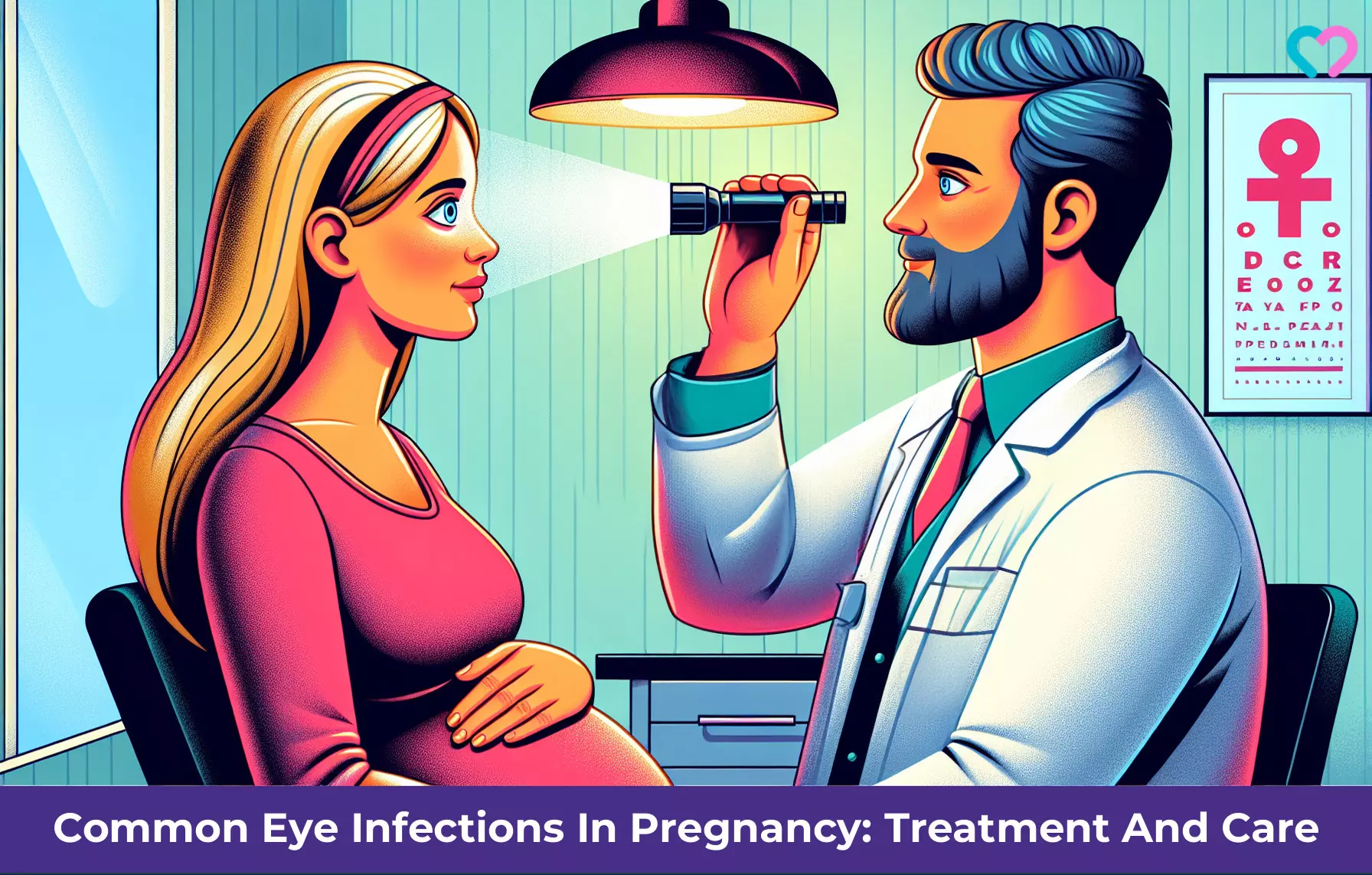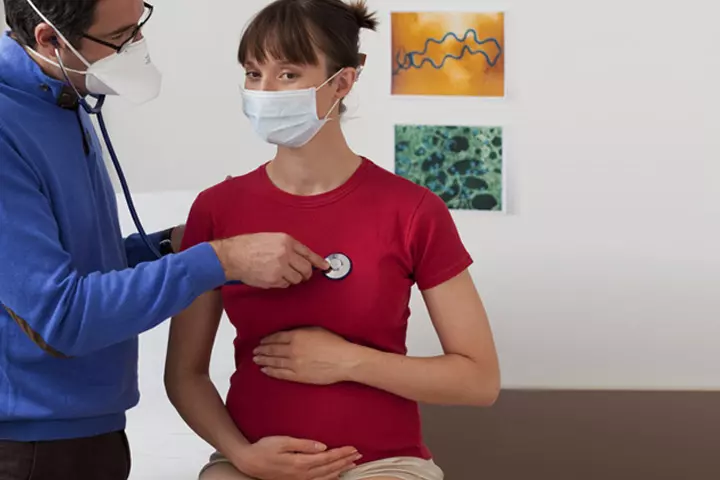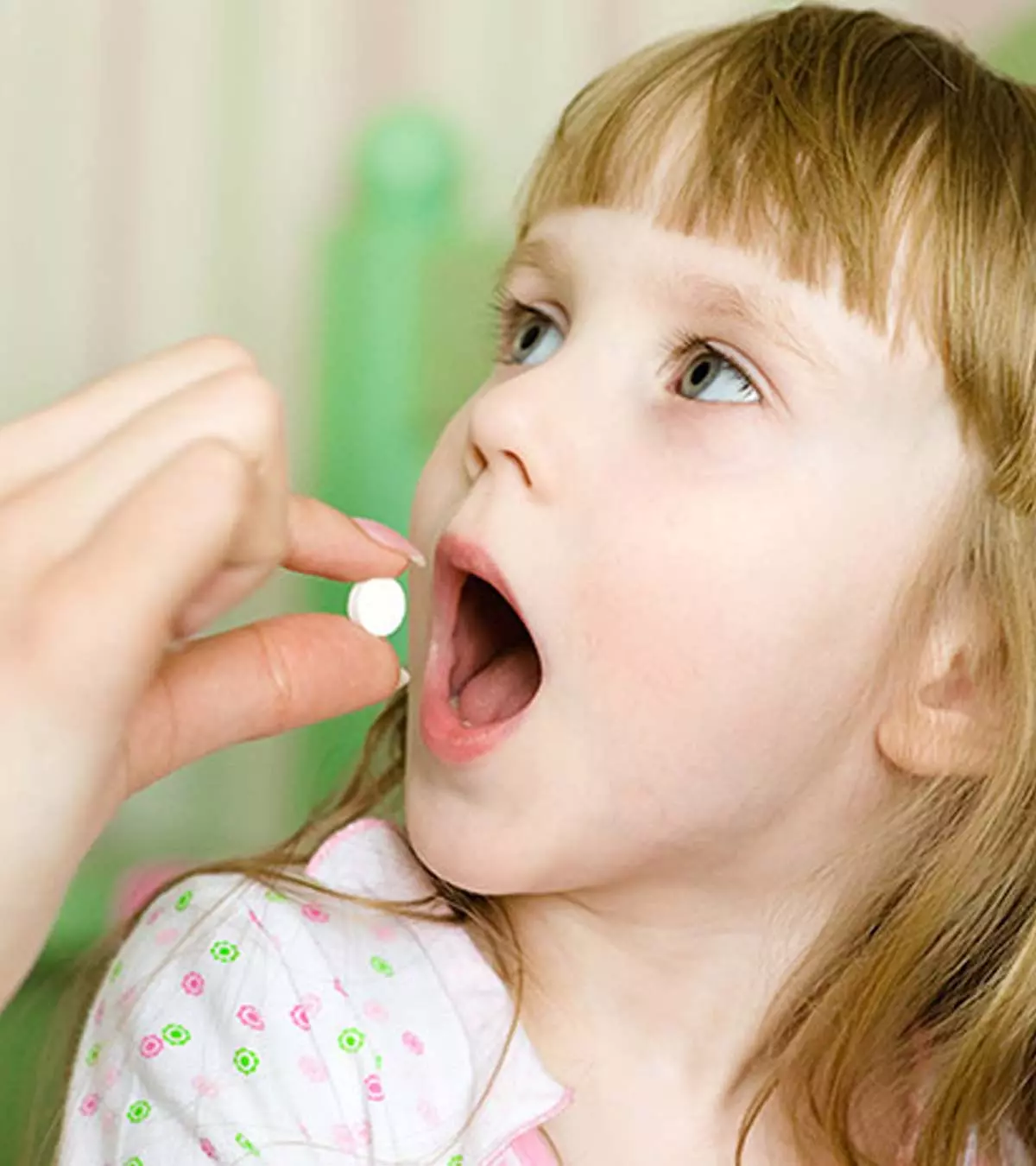
Image: ShutterStock
The hormonal changes and functioning of the immune system make women more susceptible to eye infections while pregnant (1). The common infections that affect the eye during this time are either conjunctivitis or puffiness. The increased blood flow also contributes to this cause. Although these infections are not a cause for concern and will go away eventually after running their course, they might affect your eyesight temporarily. If you notice further discomfort, consult your doctor. Read on to know more about eye infections during pregnancy, their causes, diagnosis, treatment, and prevention techniques.

Key Pointers
- The immune system and hormones of a pregnant woman are ever-changing, making her more susceptible to eye infections while pregnant.
- A pregnant woman is prone to contracting eye diseases like conjunctivitis, dry eyes, keratitis, etc.
- Most of these diseases can be treated by constantly washing your eyes, using eye drops, and hydrating yourself.
- It is important to maintain good hygiene to prevent further aggravation of the eye.
- Washing your hands regularly, keeping your eyes clean, protecting your eyes with sunglasses, being cautious with makeup, and not sharing your things with healthy people will help speed up the recovery process.
Common Eye Infections And Problems During Pregnancy
Here, we talk about the common eye infections you may get while pregnant. The doctor can diagnose the infection based on the signs and symptoms you experience.
1. Pink eye/ Conjunctivitis

It is an inflammation of the conjunctiva, a thin membrane covering the white surface of the eye. It might make the eyes severely red and can spread quickly. This common condition is likely to go away within a week. It is primarily caused by a bacteria or virus or may develop from allergies, foreign particles, contact lenses, systemic infections, or chemicals (2) (3).
Symptoms include
- Redness in the eye
- Itching and burning sensation
- Swelling
- Pain or irritation
- Sensitivity to light
- Feels like there is some particle in the eye
- Discharge that may prevent your eye from opening when you wake up from sleep
Treatment and care
- Your doctor may prescribe antibiotic eye drops for bacterial conjunctivitis and antihistamine drops for allergic conjunctivitis.
- Keep cleaning your eyelids using a clean, wet cloth.
- Apply cold or warm compresses for pain relief.
- Use saline eye drops (also known as artificial tears) as they soothe the eye. They can also flush out any particle stuck in the eye.
- Never squeeze or rub your eyes. Avoid touching your eyes with dirty or unwashed hands.
 Point to consider
Point to consider2. Keratitis
It is an inflammation of the cornea, a clear layer that covers the pupil and iris. It is caused by bacteria, viruses, fungus, or may develop from regular use of contact lenses, humid climates, or corticosteroidiMedicines that may help reduce inflammation eye drops (if you have been using it for another eye condition) (5) (6).
Symptoms include
- Redness and swelling of the eye
- Pain or discomfort in the eye
- Abnormal discharge
- Sensitivity to light
- Blurry vision
- Discomfort when opening and closing the eyelids
- Sensation of something stuck in the eye
Treatment and care
- Prescription oral medications and eye drops that could be antibiotic, antifungal, or antiviral depending on the cause.
- The doctor may also suggest artificial tears for lubrication.
3. Uveitis
It is an inflammation of the uvea, the middle layer of the eye that transports blood to your retina. It is most likely caused by a virus (such as herpes) and may develop from eye injuries or autoimmune disordersiDiseases in which the body’s immune system mistakes healthy cells as foreign and attacks them , such as rheumatoid arthritis (7). Pregnant women suffering from high blood pressure during pregnancy or after delivery (Pre-eclampsia/EclampsiaiA complication of high blood pressure in pregnant women, characterized by the onset of convulsions during pregnancy or childbirth ) are mostly at risk of developing non-infectious uveitis too. Vision impairment could be a complication of severe uveitis (8).
Symptoms include
- Pain and redness in the eye
- Small floaters in your vision
- Sensitivity to light
- Blurry vision
Treatment and care
- Wearing dark glasses
- Your doctor may suggest prescription eye drops with anti-inflammatory medications
- Ocular anti-inflammatory injections are also prescribed in some case
Apart from the above eye infections, the many changes in pregnancy may also lead to a few eye problems, which we discuss next.
4. Dry eyes
Dry eyes are a common eye issue among pregnant women. A study that assessed the incidence of eye problems in pregnant women found that “the most common ophthalmic conditions found in this study population were dry eye, conjunctivitis, and ametropiaiVision disorders where the eye cannot focus light precisely on the retina (9).” This usually happens due to a lack of enough moisture in the eye but could also develop due to hormonal changes, which could affect the meibomian glandsiOil-producing glands located in eyelids that secrete a protective layer of oil to prevent tear evaporation and maintain eye moisture that line the eyelids and keep the tears oily (10). In this condition, the tear film that protects the eyes becomes thinner and becomes prone to frequent drying. In some cases, dryness may be constant, and for some, it is likely to come and go.
Also, the lacrimal glandsiTear-producing glands situated above each eye that generate and release tears to lubricate, clean, and protect the eye surface produce lesser lubricating fluid, worsening the symptoms. Dryness is further aggravated by dehydration, which may happen from vomiting and nausea during pregnancy (11).
Symptoms include
- Red and sore eyes
- Sticky eyelids
- Blurred vision when you blink your eyes
- Feeling of grit in your eyes
Treatment and care
- Your doctor might prescribe over-the-counter medications, artificial tears, or ointments.
- Keep yourself hydrated with plenty of fluid intake.
- Create a humid atmosphere at home and work by keeping some plants or using a humidifier.
- Massaging the eyelids by rolling your fingertips over them could stimulate tears.
- Clean your eyes by dabbing the eyelids with cotton plugs soaked in lukewarm water.
- Restrict computer work, television, or mobile time, and get enough sleep.
- Applying warm compress could stimulate and open the oil glands, which prevent the moist layer from becoming dry.
- Punctal occlusioniA treatment intervention for dry eye syndrome, which helps retain moisture in the eyes is performed in severe cases, where the doctor will block the tear ducts.
 Quick fact
Quick factAccording to a report by the American Academy of Ophthalmology, wearing contact lenses for extended periods can contribute to eye dryness (13). Heather, a mom and vlogger, shares her personal experience with eye problems during her pregnancy around 16 weeks. She recalls dealing with extreme dryness in her eyes, especially while wearing contacts. She says, “I started feeling really dry. I left my eye drops at home, and I’m like, oh no, this is not good. I’m sitting there kind of just like steadily blinking, kind of just trying to blink through it. I was trying to avoid being outside because I was going to be outside the whole time, so the wind was probably not helping. It finally got better, I think, kind of like when I was busy. I just kind of either ignored it or, you know, I just didn’t realize it was bothering me. But it kind of just felt like that the whole day, like there’s something in my eye. It was almost like there was a cut in my contact…Every time I would blink, it would get really blurry, like at the bottom of my eye I could see a blurred spot (i).”
5. Itchy eyes (blurry eyes)

Allergies are the primary cause of itchy eyes. Water retention during pregnancy may also affect the thickness of the cornea, thereby weakening the vision (14). Cholestasis of pregnancyiA liver disorder typically affecting pregnant women in the late second or third trimester , where there is an obstruction of bile flow from the liver, may also have itchy eyes as one of its symptoms (15).
Treatment and care
- Your doctor might prescribe over-the-counter medications such as Diphenhydramine or Chlorpheniramine (16).
- Limit the use of contact lenses and do not wear them during the night.
6. Puffy or swollen eyes
Along with the swelling of the face and extremities, your eyelids might also become puffy or swollen due to water retention (17). Stress, dehydration, and lack of sleep are a few other causes that can cause puffy or swollen eyes (18). Although this is not likely to be a serious side effect, you may feel uncomfortable.
Treatment and care
- Address water retention by having a healthy, low-sodium diet and improving water intake.
- Meditation and regular exercises could help.
- Get enough sleep.
- Apply a cold compress.
Your doctor will examine the eye and may send a tissue or fluid sample for the test. Based on the observations, you may have to take medication, eye drops, or an ointment. Your doctor may also suggest some home care measures that might provide relief.
8 Tips To Follow When Having Eye Infections
Following good hygienic practices might limit your chances of exposure to other factors that may cause or aggravate different eye problems.
- Wash your hands: Wash your hands with antibacterial soap and water before touching your face or eyes. Clean your hands after coming from outdoors. Touching or rubbing your eyes with unclean hands could make an eye infection worse (19).

- Keep your eyes clean: Splash cold water in your eyes to remove any foreign particles. This might also soothe the blood vessels. Do not over-rub your eyes.
- Protect your eyes: UV rays from the sun are harmful and could damage the lens and retina of the eye. Wearing a pair of good sunglasses might help. They protect your eyes from both dust and UV radiation (20).
- Be cautious with makeup: Makeup might aggravate bacteria and make the infections worse. Do not share cosmetics, such as lipsticks and makeup sponges or brushes, as you could get an infection from someone else. Remove makeup before going to bed. Check for the expiry dates and seals. Do not use makeup if you are prone to eye allergies and infections (21).
 Quick tip
Quick tip- Keep your stress levels low: Stress due to poor sleep, overworking, and diet could affect the immune system, which might increase your risk of contracting eye diseases (23).

- Eyewear care: Keep your spectacles and contact lenses tidy, and do not share the cleaning wipes. Follow hygiene before and after handling them (24).
- Warm compress: It could help soothe the blood vessels, heal inflammation, and provide relief from pain and discomfort in the eye (25). Hold a damp cloth, soaked in warm water, against the eye for some time.

- Avoid sharing things: Do not share towels, pillows, linens, or washcloths. Maintain good hygiene and wash them regularly (26).
Frequently Asked Questions
1. Is pink eye dangerous during pregnancy?
Contracting pink eye in pregnancy is relatively common and not typically dangerous. However, it is highly contagious. Therefore, take preventive measures to ensure you do not contract the infection from someone who has it.
2. Can sore eyes affect pregnancy?
There are no studies that state about sore eyes, causing any pregnancy complications. In general, any condition that is ignored, and not managed in time may lead to serious complications.
3. Can I use antibiotic eye drops while pregnant?
Erythromycin, ophthalmic gentamicin, ophthalmic tobramycin, and polymyxin B are considered safe during pregnancy (17). However, you can use them only if the prenatal care provider prescribes them for an eye infection.
4. Can an eye infection during pregnancy cause preterm labor or birth?
Chlamydia infection during pregnancy may cause inflammation of the eye in rare cases. The infection, if untreated, may be associated with preterm labor, premature rupture of membranes, and low birth weight. However, there may be other accompanying symptoms such as vaginal discharge, bleeding after intercourse, pain when urinating, and abdominal or pelvic pain (27).
5. What home remedies can I try for eye irritation during pregnancy?
For mild irritation, you might gently rinse your eyes with cold water and apply a warm compress. However, avoid unapproved home remedies and consult your healthcare provider for advice specific to your situation.
Women are at higher risk of contracting eye infections while pregnant due to changes in their blood flow, hormones, and immune system functioning (28). Common eye infections or problems include conjunctivitis, keratitis, dry eyes, and blurry eyes. Based on the condition, the doctor may treat the condition by prescribing diet changes, ophthalmic medications, or the use of a humidifier. However, following good hygiene practices can help prevent these issues from occurring. For example, washing hands regularly, using UV-protection sunglasses, and rinsing towels and linens can help reduce the risk of eye infections.
Infographic: Home Care And Prevention Tips For Eye Infections
Irrespective of the cause, eye infections during pregnancy can be quite uncomfortable due to the pain and itching. This can, in turn, interfere with your pregnancy health and mood. Here are a few things you can try to reduce the risk of occurrence and minimize discomfort.
Some thing wrong with infographic shortcode. please verify shortcode syntax
Illustration: Common Eye Infections In Pregnancy: Treatment And Care

Image: Dall·E/MomJunction Design Team
Check out this video to understand how pregnancy affects your vision and acquire knowledge on ways to safeguard and maintain a healthy eyesight throughout this memorable period.
Personal Experience: Source
MomJunction articles include first-hand experiences to provide you with better insights through real-life narratives. Here are the sources of personal accounts referenced in this article.
i. Pregnancy vlog: Week 16 Dry Skin & Dry Eyes??https://www.youtube.com/watch?feature=shared&v=zLQedA2Zk8s
References
- Athena P Kourtis et.al; (2015); Pregnancy and Infection.
https://pmc.ncbi.nlm.nih.gov/articles/PMC4459512/ - Pink Eye: Causes and How It Spreads.
https://www.cdc.gov/conjunctivitis/causes/ - Conjunctivitis: What Is Pink Eye?
https://www.aao.org/eye-health/diseases/pink-eye-conjunctivitis#pinkeyetreatments - Common eye infections.
https://australianprescriber.tg.org.au/articles/common-eye-infections.html - Keratitis.
https://www.health.harvard.edu/a_to_z/keratitis-a-to-z - Keratitis.
https://www.aoa.org/healthy-eyes/eye-and-vision-conditions/keratitis?sso=y - What Is Uveitis?
https://www.aao.org/eye-health/diseases/what-is-uveitis - Uveitis.
https://medlineplus.gov/ency/article/001005.htm - Thiago Gonçalves dos Santos Martins et.al; (2025); Eye diseases during pregnancy: a study with the medical data warehouse in the eye clinic of the Ludwig-Maximilians-Universität München in Munich in Germany.
https://pmc.ncbi.nlm.nih.gov/articles/PMC9070990/ - Hormones in Dry-Eye: A Delicate Balance.
https://www.reviewofophthalmology.com/article/hormones-in-dry-eye-a-delicate-balance - Nursal Melda Yenerel and Raciha Beril Küçümen; (2015); Pregnancy and the Eye.
https://pmc.ncbi.nlm.nih.gov/articles/PMC5082244/ - Kofi Asiedu et.al; (2025); Dry eye, its clinical subtypes and associated factors in healthy pregnancy: A cross-sectional study.
https://journals.plos.org/plosone/article?id=10.1371/journal.pone.0258233 - What Is Dry Eye? Symptoms, Causes and Treatment.
https://www.aao.org/eye-health/diseases/what-is-dry-eye - Kaur G et.al; (2014); Pregnancy Induced Ocular Changes and Associated Risk of Ocular Medications.
https://pdfs.semanticscholar.org/8beb/158265deef6443769faa4785a880219e9540.pdf - Cholestasis of Pregnancy.
https://www.urmc.rochester.edu/encyclopedia/content?ContentTypeID=90&ContentID=P02440 - Which over-the-counter cold medications are safe during pregnancy?
https://utswmed.org/medblog/otc-cold-medication-safe-pregnancy/ - Swelling in the Third Trimester: What’s Normal, When to Worry, What to Do.
https://www.lamaze.org/Giving-Birth-with-Confidence/GBWC-Post/swelling-in-the-third-trimester-whats-normal-when-to-worry-what-to-do - Puffy Eyes? How To Get Rid of Eye Bags.
https://health.clevelandclinic.org/how-to-get-rid-of-eye-bags - Eye Infections: Be Careful Now or Regret It Later.
https://www.aao.org/eye-health/tips-prevention/eye-infections-be-careful-now-to-avoid-them - Eye Care.
https://medlineplus.gov/eyecare.html - Old Makeup Can Cause Serious Eye Infections.
https://www.urmc.rochester.edu/encyclopedia/content?ContentTypeID=1&ContentID=724 - Pink Eye (Conjunctivitis).
https://my.clevelandclinic.org/health/diseases/pink-eye-conjunctivitis - Surprising Links Between Stress and the Eyes.
https://www.aao.org/eye-health/tips-prevention/anxiety-stress-dry-eye-glaucoma-iop - Eye Infections From Contact Lenses.
https://www.aao.org/eye-health/diseases/contact-lens-related-eye-infections - Warm Compresses for Eye Problems.
https://www.healthlinkbc.ca/search?kw=health+topics+warm+compresses+eye+problems - How to Prevent Pink Eye.
https://www.cdc.gov/conjunctivitis/prevention/index.html#:~:text=Wash%20pillowcases%2C%20sheets%2C%20washcloths%2C - Chlamydia and pregnancy.
https://www.pregnancybirthbaby.org.au/chlamydia-and-pregnancy - Sushil Chawla et.al; (2013); Ophthalmic considerations in pregnancy.
https://pmc.ncbi.nlm.nih.gov/articles/PMC3862469/#!po=2.77778
Community Experiences
Join the conversation and become a part of our nurturing community! Share your stories, experiences, and insights to connect with fellow parents.
Read full bio of Dr. Arpita Chakraborty
Read full bio of Rebecca Malachi
Read full bio of Swati Patwal
Read full bio of Aneesha Amonz

















